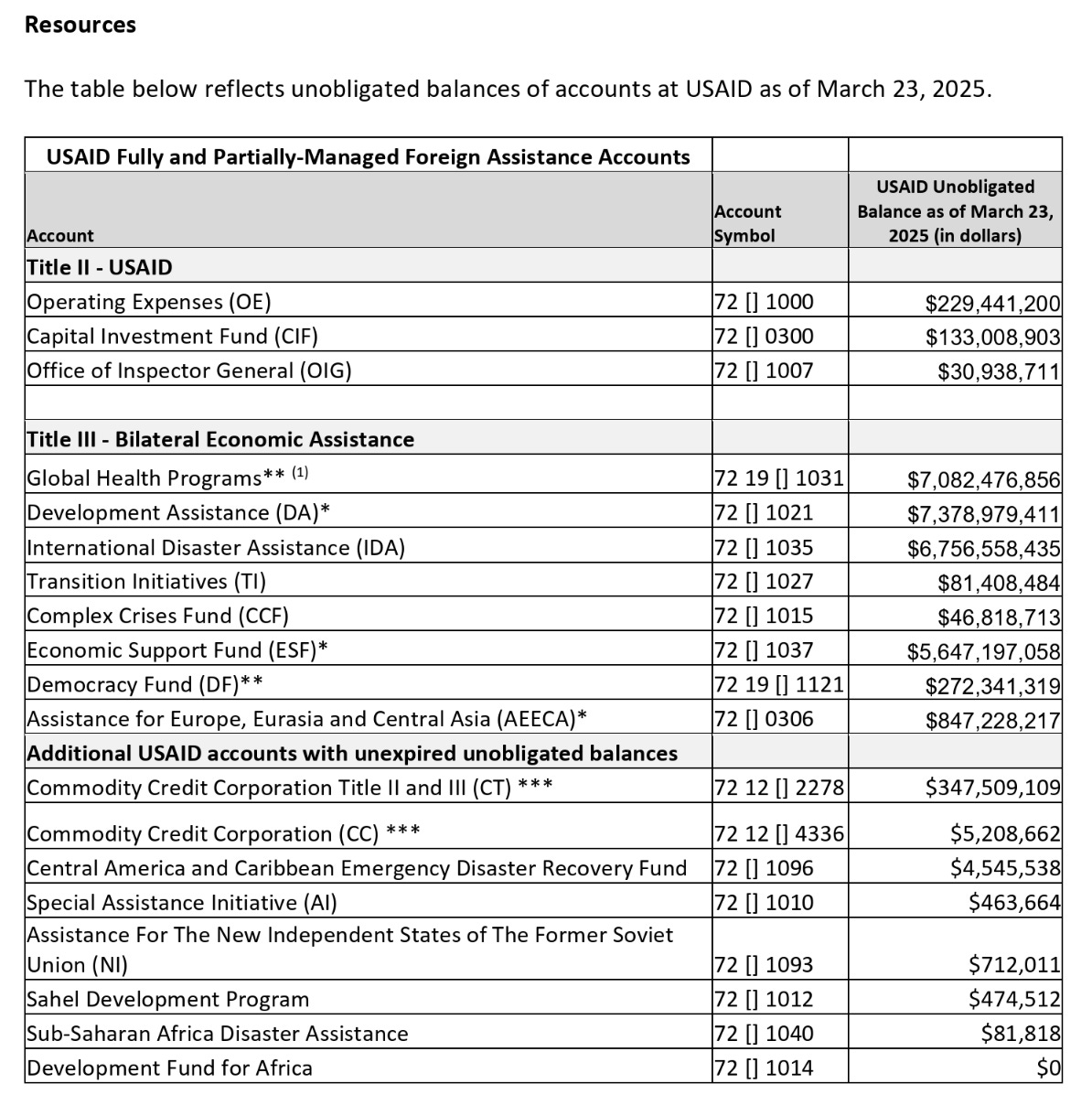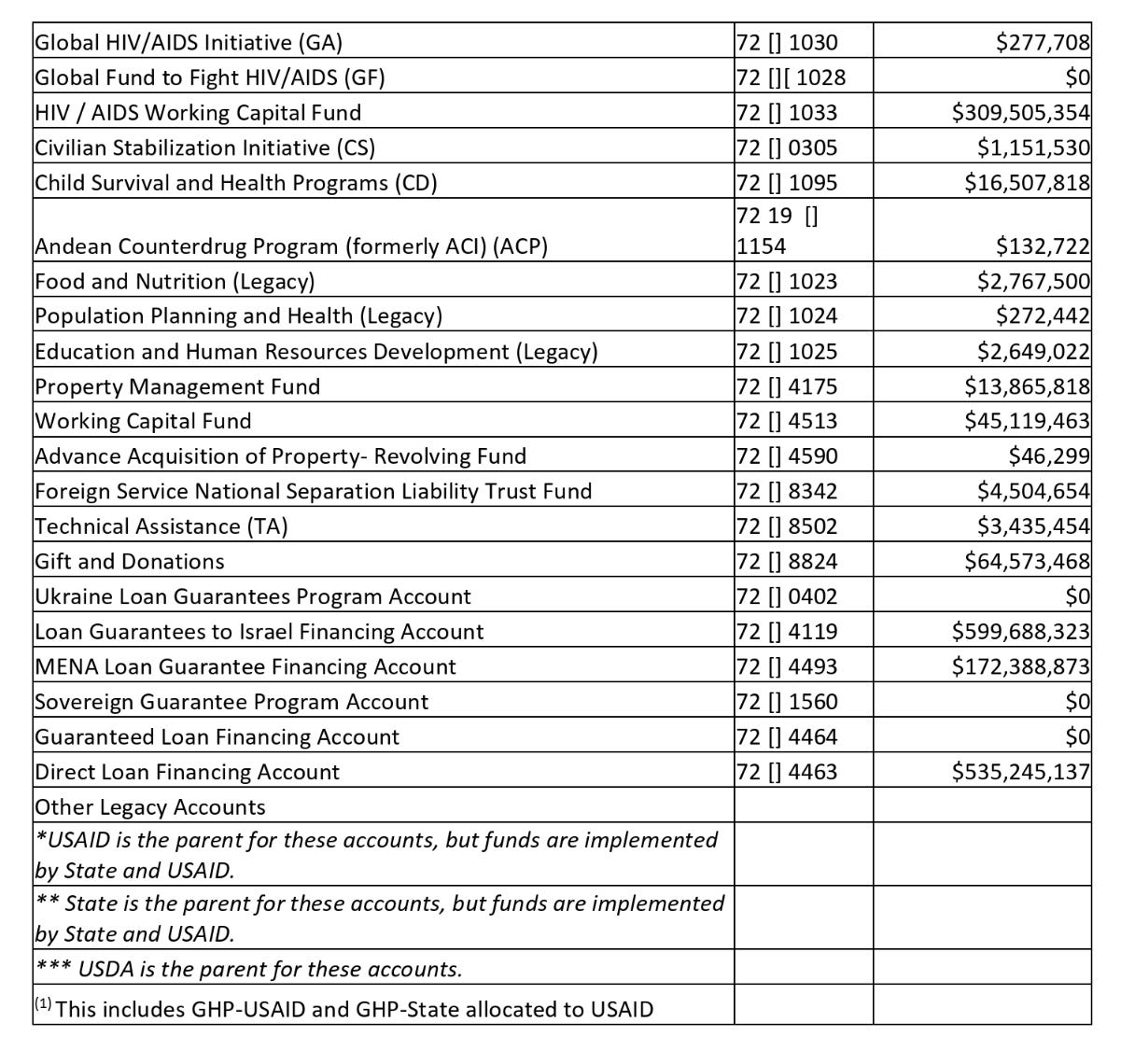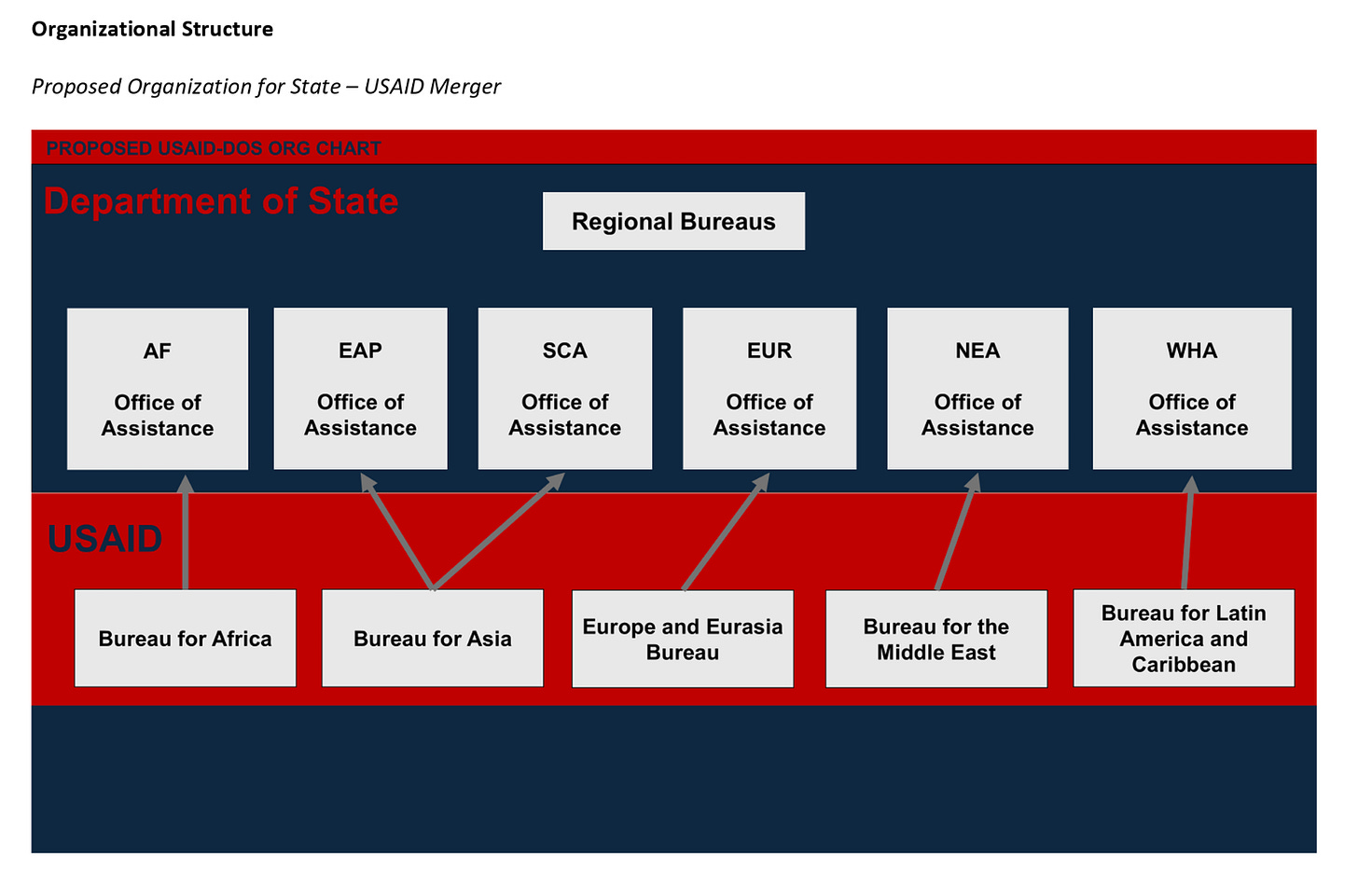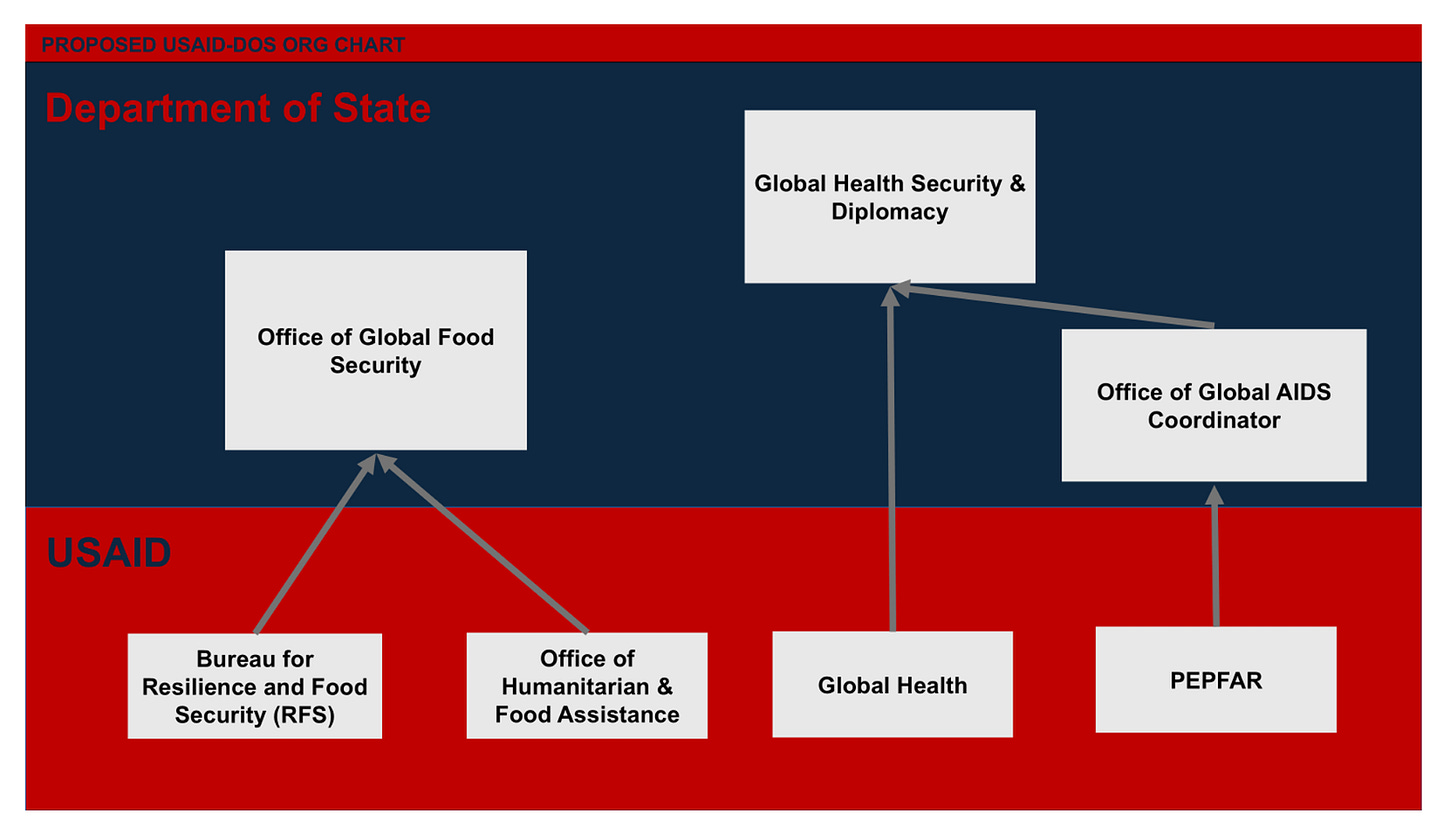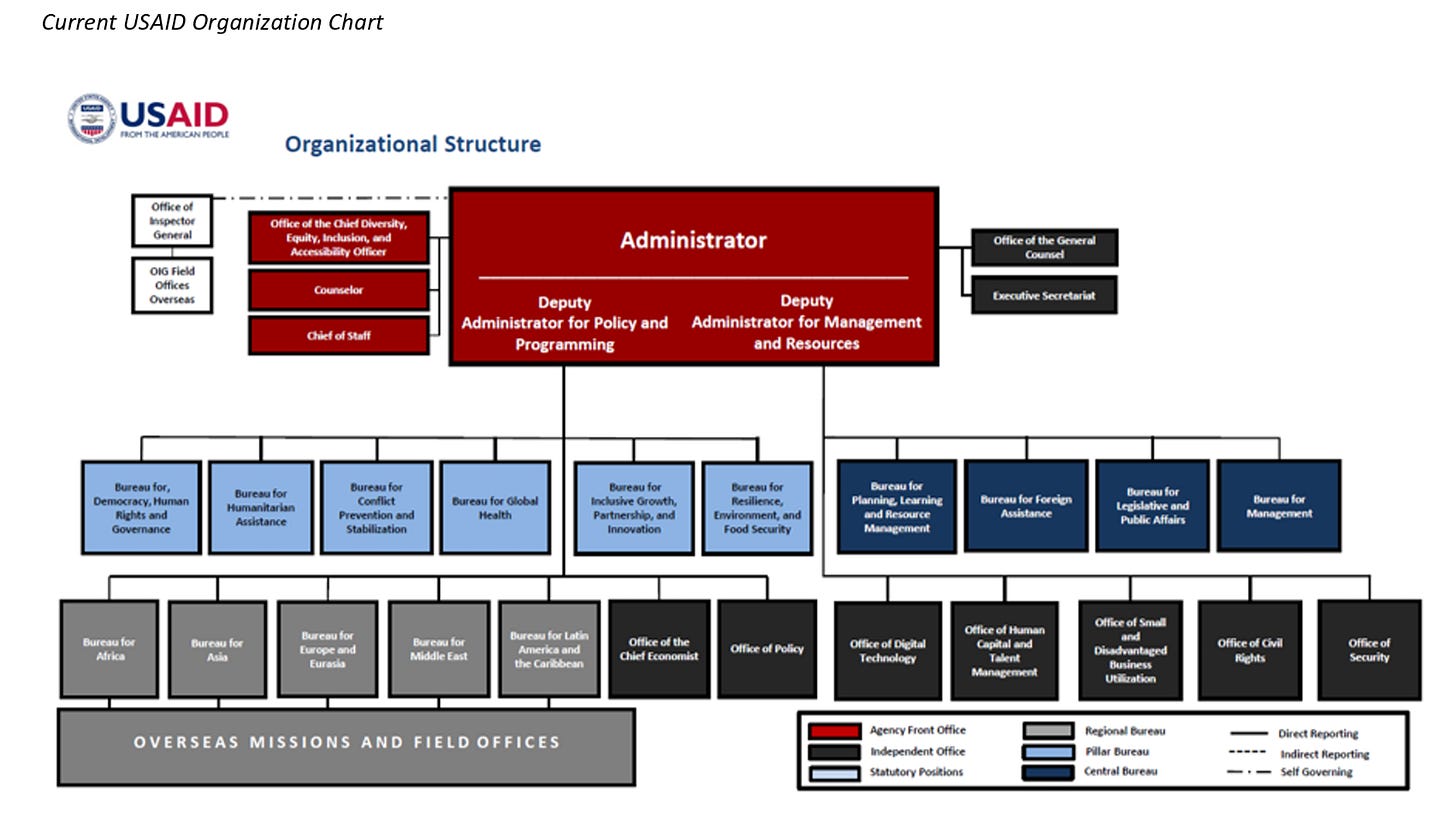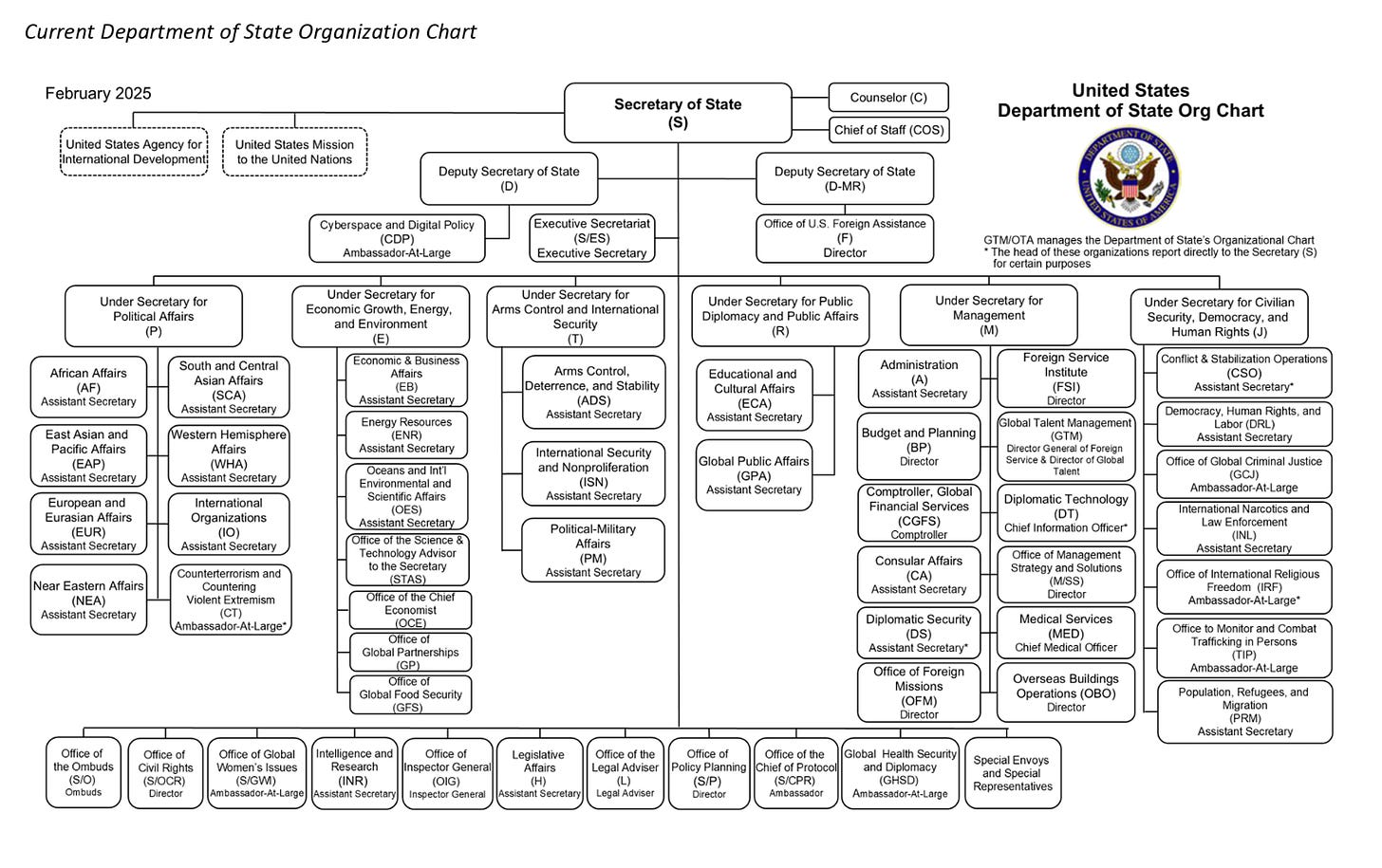USAID: The Final Solution...
DOGE has submitted the plan for merging State and USAID to Congress for its rubber stamp of approval.
SENSITIVE BUT UNCLASSIFIED
March 28, 2025
CONGRESSIONAL NOTIFICATION TRANSMITTAL LETTER
Consistent with sections 7015 and 7063(a) of State, Foreign Operations, and Related Programs Appropriations Act, 2024 (Div. F, P.L. 118-47), as carried forward by the Further Continuing Appropriations Act, 2025 (Div. A, P.L. 118-158), and section 34 of the State Department Basic Authorities Act of 1956 (22 U.S.C. 2706), the Department of State (the Department) and the
U.S. Agency for International Development (USAID) are notifying their intent to undertake a reorganization that would involve realigning certain USAID functions to the Department by July 1, 2025, and discontinuing the remaining USAID functions that do not align with Administration priorities.
In order to support this reorganization, the Department intends to restructure certain Department bureaus and offices that would implement programs and functions realigned from USAID. In connection with this transition, substantially all USAID personnel will be separated from federal service pursuant to Reduction-In-Force procedures. Consistent with applicable law, the Department intends to conduct a separate and independent hiring process to build foreign assistance capacity; the Department intends for this process to be available to eligible USAID personnel. During the transition period until such legislation is enacted, some funds from the Operating Expenses and Capital Investment Fund accounts in title II of the SFOAA may be made available to support these functions at the Department of State as outlined below.
The planned changes are explained further in the attached enclosure.
Recipients:
House Foreign Affairs Committee Senate Foreign Relations Committee House Appropriations Committee
House Subcommittee on National Security, Department of State, and Related Programs Senate Appropriations Committee
Senate Appropriations Subcommittee on State, Foreign Operations, and Related Programs
We hope this information is helpful. Please do not hesitate to contact us with questions.
Sincerely,
Paul Guaglianone Senior Bureau Official
Bureau of Legislative Affairs
CONGRESSIONAL NOTIFICATION
Introduction
Following Secretary Rubio’s February 3, 2025, letter initiating consultations regarding USAID, the Department of State is notifying Congress of its intent to realign select USAID functions to the Department and to phase out others. This decision aligns with the Administration’s broader efforts to streamline government functions, eliminate redundancy, and enhance accountability. The transition will ensure that foreign assistance operations are fully aligned with U.S. diplomatic and national security objectives. By integrating these functions into the Department, the Administration aims to improve efficiencies while maintaining critical humanitarian assistance and national security programs.
Background
USAID conducted a comprehensive review of its existing programs and awards to assess their alignment with U.S. foreign policy objectives. As a result of this review, numerous programs were discontinued, while 898 active grants, cooperative agreements, and contracts remain in place. The total amount for these activities is approximately $78 billion in total vehicle value, with approximately $8.3 billion in unobligated remaining value. Separately, USAID retains 421 operational and critical service contracts and other agreements.
In the initial phase of the transition, the Department would take on the management of USAID’s financial and administrative systems and management of USAID’s remaining operations and ongoing foreign assistance programs. These functions would, in the first instance, be provided as a service via interagency agreement in order to ensure that USAID programs can be safely and effectively administered by the Department during the transition period. Payment processing systems will be integrated into the Department to ensure a streamlined approach to managing life-saving humanitarian aid and national security programs. The State Department would also integrate USAID’s partner vetting systems and is working to create a more efficient vetting system in the future. The Department intends for this first phase of the transition to be completed by July 1, 2025.
The Department anticipates requesting, in its fiscal year 2026 budget request, funding in the relevant Department appropriations to support the programs previously implemented by USAID, and proposing legislation to abolish USAID as an independent establishment.
Key Functions
The Department has carefully considered which USAID programs could continue to advance the Administration’s foreign policy objectives. Those have been determined to be humanitarian assistance, global health functions, strategic investment, and limited national security programs. The Bureau for Humanitarian Assistance (BHA) provides lifesaving humanitarian assistance—including food, water, shelter, emergency health care, sanitation and hygiene, and essential nutrition services—to the world’s most vulnerable and hardest-to-reach people. The Bureau for Global Health helps reduce health disparities, delivers lifesaving vaccines, promotes child and maternal health, and works toward control and elimination of malaria, tuberculosis, and other diseases. These functions would be realigned to relevant bureaus and offices in the Department to ensure continuity of critical operations and that the United States continues to effectively administer life-saving and strategic aid across the globe. Other functions are likely to be substantially duplicative of existing functions and capabilities at the Department, and would be eliminated in the restructuring plan.
Reorganization
The Department would streamline its organizational structure to best accommodate the new humanitarian assistance and global health functions being absorbed from USAID. (See Organizational Chart in Tab #1). The Department has engaged both senior political and career staff to evaluate the most efficient and effective way to implement these USAID programs and activities.
Regional Bureaus
The Department’s robust regional bureaus would assume primary responsibility for the administration and coordination of bilateral and regional USAID programming. An office of foreign assistance would be established in each of the Department’s regional bureaus that do not already have such an office. The functions of USAID’s regional bureaus would be realigned to a corresponding State regional bureau. In addition, appropriate procurement and program management functions from USAID’s pillar and management bureaus would be realigned to the relevant Department bureaus. Management of assistance programs by regional bureaus would ensure that aid programs are delivered based on regional and local priorities, and consistent with applicable U.S. foreign policy interests in those locations.
USAID has the following five regional bureaus: (1) Latin America and the Caribbean (LAC); (2) Europe & Eurasia (E&E); (3) Middle East (ME); (4) Africa (AFR); and (5) Asia (ASIA). Their functions would be realigned to Department’s regional bureaus as follows: AFR functions would be realigned to the Bureau of African Affairs; ASIA functions would be realigned to the Bureaus of South and Central Asian Affairs and East Asian and Pacific Affairs; E&E functions would be realigned to the Bureau of European and Eurasian Affairs; ME functions would be realigned to the Bureau of Near Eastern Affairs; and LAC functions would be realigned to the Bureau of Western Hemisphere Affairs.
State Department Office of Global Food Security (GFS)
The life-saving food and agriculture assistance programs from USAID’s Bureau for Humanitarian Assistance would be implemented by an expanded Office of Global Food Security reporting to the Department’s Under Secretary for Economic Growth, Energy, and Environment (E). Focusing these efforts within the E family reflects the central role that commerce and supply chain infrastructure – both domestic and overseas – plays in USAID’s food assistance programming.
The Department remains committed to ensuring that its food assistance programs continue to support American agricultural interests in efficiently delivering food to populations in need across the globe.
State Department Bureau of Global Health Security and Diplomacy (GHSD)
The functions of USAID’s Global Health (GH) bureau would be realigned to the State Department’s Bureau of Global Health Security and Diplomacy. The Department’s existing GHSD bureau is already responsible for the administration of intergovernmental health programming and leads, manages, and oversees the U.S. President’s Emergency Plan for AIDS Relief (PEPFAR) program. USAID’s GH programs are already closely coordinated with GHSD, which possesses relevant expertise to responsibly and efficiently manage USAID’s life-saving programs. The Department anticipates making significant investments to ensure that GHSD is able to effectively support USAID’s substantial PEFPAR and other life-saving health programs. Likewise, GHSD would be able to effectively manage USAID’s critical health supply chain network with greater interdepartmental and intergovernmental coordination.
Merging USAID’s flagship global health programs into GHSD would result in considerable synergies, including for PEPFAR. For example, currently, GHSD plans and coordinates all appropriated funds for PEPFAR, and provides funds to USAID for program administration. Consolidating these functions into a single bureau would result in efficiencies in the planning and delivery of essential PEPFAR aid, allowing the Department’s programs to achieve greater impact with fewer dollars, with fewer wasted dollars on indirect and administrative costs.
Other Functional Bureaus
In limited cases, certain programs may be managed by appropriate subject matter or functional bureaus at the Department. For example, the Department’s Educational and Cultural Affairs (ECA) office manages exchange programs and could potentially implement some education assistance programs. Additionally, economic growth, trade, and energy-related programming could be administered by the Department’s Bureau of Economic & Business Affairs (EB).
Other Bureaus
The remaining USAID bureaus and offices would be substantially abolished. Certain contracting, administrative, management, and executive functions would be realigned to analogous functions at the Department. For example, certain contracting functions and personnel in USAID’s Office of Acquisitions and Assistance (OAA) may be integrated into the Department’s Office of Global Acquisition to support expanded foreign assistance procurement activity. Legal, human resources, records management, and financial functions would also be integrated into appropriate offices at the Department.
The Department would also administer certain statutorily required functions, as required by law. For those statutory functions that are expressly assigned to USAID or its personnel under the law, the State Department will propose legislative changes to allow the State Department to perform any ongoing functions.
USAID Personnel
Substantially all USAID personnel will be separated from federal service within the current fiscal year via Reduction-In-Force procedures, consistent with applicable law. As part of this process, USAID missions overseas would be closed, U.S. direct hire personnel overseas would be returned to the United States, and most USAID locally employed staff would be separated from U.S. government service in accordance with local law. USAID and the Department of State would dedicate significant resources to ensuring that affected U.S. direct hire personnel posted overseas would receive safe, timely, and accessible repatriation travel and other arrangements.
The Department intends to commence, consistent with applicable law, appropriate hiring processes to bring in relevant Civil Service and Foreign Service personnel with the relevant skills and expertise to build foreign assistance capacity and administer USAID programs and activities. The Department anticipates making these processes available for eligible USAID personnel and external candidates after the USAID Reduction-In-Force process has been completed, consistent with applicable law.
The Department is not currently in a position to accurately project its needs or the exact numbers of USAID personnel to be hired in connection with the realignment of USAID’s programs and activities. The Department also anticipates assigning or assuming the contracts of certain former USAID domestic and foreign Personal Services Contractors (PSC) that possess relevant expertise and/or are located in strategic areas.
Financial Plan
The Department of State would manage USAID operational accounts and activities as required, ensuring that operations are closed out in a smooth and orderly transition. More specifically, the Contracting and Agreement Officer authorities and personnel would move to the Department. The Operating Expense (OE) and Capital Investment Fund (CIF) Accounts, which are appropriated to carry out section 667 of the Foreign Assistance Act (FAA) would be administered by the Department for activities associated with administering foreign assistance. During the first phase of the transition, USAID would transfer or allocate OE funds to the State Department under section 632 of the FAA. Consistent with section 667 of the FAA, the President designated USAID as the agency responsible for administering part I of the FAA. In a subsequent phase of the transition, the Department would request the President to designate the Department as that agency instead, once the Department is prepared to take on that responsibility.
The Department of State would assume responsibility for humanitarian assistance programming, ensuring that these programs are integrated with broader diplomatic efforts and national security goals. BHA would be abolished and its functions realigned to the Department. Funding associated with Title II of P.L. 480 (also known as Food for Peace) is appropriated to the U.S. Department of Agriculture, in accordance with the Agriculture, Rural Development, Food and Drug Administration, and Related Agencies Appropriations Act, 2024 (P.L. 118-42), as carried forward by the FY 2025 Continuing Appropriations Act (P.L. 118-83). Under the Food Security Act of 1985 (P.L. 99-198), the donation of agricultural commodities to foreign countries is implemented by the USAID Administrator. Secretary Rubio, as current acting Administrator of USAID, will continue to oversee the implementation of this program going forward until appropriate legislation is enacted authorizing the Department to assume this function.
Separately, USAID anticipates standing up a claims settlement process to ensure that any applicable claims of contractors, vendors, personnel or others are timely and adequately addressed by USAID. USAID would continue to operate this process until appropriate legislation is enacted to facilitate the transfer to the Department.




